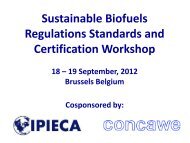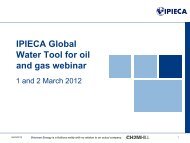WSSD Report FINAL! - OGP
WSSD Report FINAL! - OGP
WSSD Report FINAL! - OGP
Create successful ePaper yourself
Turn your PDF publications into a flip-book with our unique Google optimized e-Paper software.
CONTRIBUTING TO SUSTAINABLE DEVELOPMENT<br />
Urban air quality<br />
●<br />
●<br />
●<br />
The collaborative approach allowed for:<br />
leveraging of funding to permit testing of a large<br />
number of vehicles;<br />
broad dissemination of results among<br />
participants and in scientific papers in the open<br />
literature; and<br />
a mechanism for directly comparing<br />
commercially available diesel fuels with advanced<br />
low-sulphur formulations, synthetic diesel<br />
(Fischer-Tropsche) and compressed natural gas.<br />
Global energy management system<br />
cuts emissions<br />
System (G-EMS) to further improve and sustain<br />
energy efficiency at their refineries and chemical<br />
plants worldwide. G-EMS provides the capability to<br />
reduce plant energy consumption by an additional<br />
15 per cent or more.<br />
At the heart of G-EMS is a set of ‘best practices’ for<br />
operation, maintenance, control, and design of plant<br />
facilities, which were compiled by internal experts<br />
who researched both within and outside the<br />
company. The common methodology provided by G-<br />
EMS allows each of their plants to identify gaps<br />
relative to these ‘best practices’, develop a gap closure<br />
plan, and measure and track ongoing results.<br />
The rigorous, comprehensive rollout of G-EMS is<br />
key to achieving the maximum energy efficiency benefits<br />
from the system. The interactions between the<br />
rollout teams and the plant personnel in each refinery<br />
and chemical plant across the world lead to improved<br />
work practices for existing equipment, enable identification<br />
of investment opportunities to further improve<br />
energy efficiency, and lay the groundwork for sustained<br />
results through measurement, accountability,<br />
and technical support. Example improvements<br />
include more frequent cleaning of heat transfer<br />
equipment and installation of facilities to generate<br />
additional electric power and steam from existing<br />
plant processes.<br />
In summary, G-EMS provides significant economic<br />
and environmental benefits and enables ExxonMobil<br />
to maintain industry leadership in energy efficiency.<br />
ExxonMobil has improved the energy efficiency of<br />
their refineries and chemical plants by 37 per cent<br />
between 1973 and 1999. Over the past two years, they<br />
have launched the Global Energy Management<br />
63

















